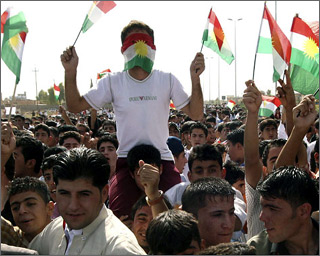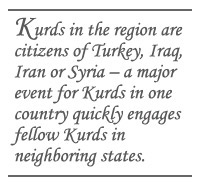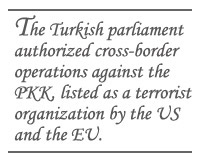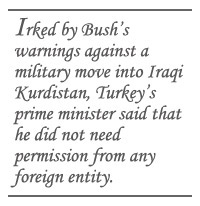Old Gripe Brings Turkey Face to Face With Iraq
Old Gripe Brings Turkey Face to Face With Iraq

authorize sending troops into northern Iraq
LONDON: The Kurdish problem has been a running sore for Iraq and Turkey since their emergence as modern states, but was little more than a local irritant – until now. With US occupation forces encamped in Iraq and the Kurdish drive for independence appearing irreversible under Washington’s wings, the issue has shot up on the international agenda, threatening to upset the fragile regional balance of power and further delay US withdrawal from Iraq.
Several strands make the issue highly combustible: tapped and untapped hydrocarbon reserves in the Kurdish territories; strong extra-territorial Kurdish solidarity; the unresolved distribution of power between the center and the provinces in post-Saddam Iraq; Washington’s ongoing coddling of Iraqi Kurds, who consolidated their quasi-independent status, with support of the US and Britain for 12 years; and the Partiya Karkeren Kurdistan (PKK) in Turkey resorting to violence to achieve autonomy for the Kurdish-majority region.
Although Kurds in the region are citizens of Turkey, Iraq, Iran or Syria, their ethnic identity tends to supersede their loyalty to the central national authority. A major event concerning Kurds in one country quickly engages fellow Kurds in neighboring states.

The Kurds in the region envy those in Iraq. Consisting of three provinces, Iraqi Kurdistan has its own army, parliament and flag. Its schools impart education in the Kurdish language, akin to Persian, not Arabic. It passed its own hydrocarbon law. And, ignoring the warnings of the oil ministry in Baghdad, it signed exploration and production contracts with nine oil companies including the Dallas-based Hunt Oil Company, which is close to the Bush administration.
Recent events put the Kurdish issue on the front burner. Despite last month’s agreement between the prime ministers of Turkey and Iraq to stamp down Kurdish terrorism, and repeated pinprick forays by the Turkish army into northern Iraq, an estimated 3,500 PKK guerrillas, based in Iraqi Kurdistan, have killed 42 Turks, soldiers and civilians.
The Turkish parliament provided the government with a yearlong window to conduct cross-border operations against the PKK, listed as a terrorist organization by the US and the European Union. The vote was 507 to 19, with all negative votes cast by ethnic Kurds, highlighting the priority that Kurds give to their ethnicity over their nationality.

Against this volatile background came the ill-considered attempt by the US House of Representatives Foreign Affairs Committee to pass legislation that inflamed Turkish opinion. The resolution describes the massacres and deportations of 1 million Armenians during World War I – when Ottoman Turkey sided with Germany against the Allies – as genocide. This is a highly sensitive subject for Turkey, successor to the Ottoman Empire. Turkey has threatened, if the House adopts this resolution, to close its airspace and ports to the US, thus reducing Pentagon effectiveness in Iraq.
After securing parliamentary authorization for “cross-border operations” – a euphemism for invasion – Turkish Prime Minister Recep Tayyip Erdogan said that such a move was not imminent.
That did not stop thousands of Iraqi Kurds in the regional capital of Irbil marching to the United Nations compound to demand intervention by the UN Security Council.
Nor did it dampen debate in Iraq as to how Iraqi authorities would respond to the Turkish army’s advance into northern Iraq. Will Kurdish militiamen – called “peshmergas,” or those ready to die – and US troops engage the Turkish soldiers? Or will the central government deploy forces to repel the incursion?
The second option is academic. The Kurdistan Regional Government (KRG) has upgraded the 75,000 peshmergas, belonging to the two ruling political parties – the Kurdistan Democratic Party (KDP) and Patriotic Union of Kurdistan (PUK) – to regular soldiers, and refused to let Iraqi troops enter its territory. Its armed forces guard the posts along the borders with Turkey and Iran.
Faced with the prospect of an onslaught by the Turkish army, the second largest in NATO, a spokesman of the KRG offered “honest dialogue” with Ankara to resolve the PKK problem without “the constant violation of Iraqi sovereignty.”
In his view, Iraqi Prime Minister Nouri al Maliki made a mistake by excluding the KRG from talks with his Turkish counterpart to forge an agreement on countering PKK terrorism.
But Turkey has shunned the government in Irbil – which repudiated the Erdogan-Maliki agreement – while loudly protesting its ever-expanding power and profile. It fears that even implicit recognition of this entity will encourage Turkish Kurds to demand autonomy as a preamble to independence.

The idea of independence for the Kurds in the region dates back to the disintegration of the Ottoman Empire after World War I, formalized in the Treaty of Sèvres in 1920. Kurds feel that US President Woodrow Wilson failed to keep his promise of delivering to them an independent state as envisaged in the treaty. They ignore the fact that the Turkish parliament rejected that treaty and the subsequent Treaty of Lausanne of 1923 made no mention of an independent Kurdistan.
More recently, heeding the call by US President George H.W. Bush at the end of the 1991 Gulf War, the Kurds in Iraq rebelled against Saddam Hussein’s regime, only to see their uprising crushed by Saddam’s forces. Washington and London created a safe haven in the north for Kurdish refugees and rebels by providing an air umbrella that continued until the Anglo-American invasion of Iraq in 2003.
Kurdish leaders agreed in March 2004 to dissolve their militias or merge them into the new Iraqi army and then later said they were postponing the agreement “indefinitely.” The US, the occupying power, did nothing.
In the interim parliament, lacking proportionate Sunni representation due to the Sunnis’ boycott of the general election, conflict developed between Shiites and Kurds. The recently empowered, deeply religious Shiite majority wanted to establish a centralized Islamic republic. But, committed to secular Kurdish nationalism, the KDP and the PUK favored a federal Iraq with a weak center.
When Shiite leaders failed to get their Kurdish counterparts to agree to diminution of the autonomy Kurdistan had enjoyed, they approached Grand Ayatollah Ali Sistani for guidance. Noting Kurdish obstinacy, Sistani recommended a federalist system, allowing one or more of the 15 non-Kurdish provinces to form a regional government with powers comparable to Kurdistan’s.
This alarmed Ankara. In contrast, the Bush administration, beholden to the Iraqi Kurds, looked on benignly as the new Iraqi constitution sowed the seeds of the republic’s break-up.
Washington’s failure to pressure the Iraqi Kurdish leadership at a crucial moment alienated the Turkish government. Matters grew worse when Ankara’s repeated appeals to the US to use its forces to curb the PKK went unheeded.
Irked by Bush’s warnings against a military move into Iraqi Kurdistan, Erdogan said that he did not need to seek permission from any foreign entity: “Did they [the Americans] seek permission from anybody when they came from a distance of 10,000 km and hit Iraq?”
What puzzles the Turkish leaders is Bush’s failure to see that they, too, combat terrorism.
“Turkey is implementing the same international rules that were implemented by those who linked the attacks on the twin towers to some organization,” explained Turkish justice minister Mehmet Ali Sahin.

But payback inevitably follows. “If Turkey conducts any attack or operation against Iraqi Kurdistan or Kurds anywhere, we are prepared to defend ourselves,” said an unnamed PKK leader. “We will spread resistance throughout Turkey and Kurdish areas in Iraq, Iran and Syria.”
The Bush administration should have tempered its indulgence toward Iraqi Kurds with pressure during the drafting of the new constitution and gotten its leaders to scale down Kurdistan’s quasi-independence to re-establish a unitary republic. The failure to do so brings it to the point where the US is seen as soft on terrorists – albeit of non-Islamist variety – facing the prospect of the only peaceful Iraqi region turning into a battlefield.
Dilip Hiro is the author of “Secrets and Lies: Operation ‘Iraqi Freedom’ and After,” and, most recently, “Blood of the Earth: The Battle for the World’s Vanishing Oil Resources,” both published by Nation Books, New York.